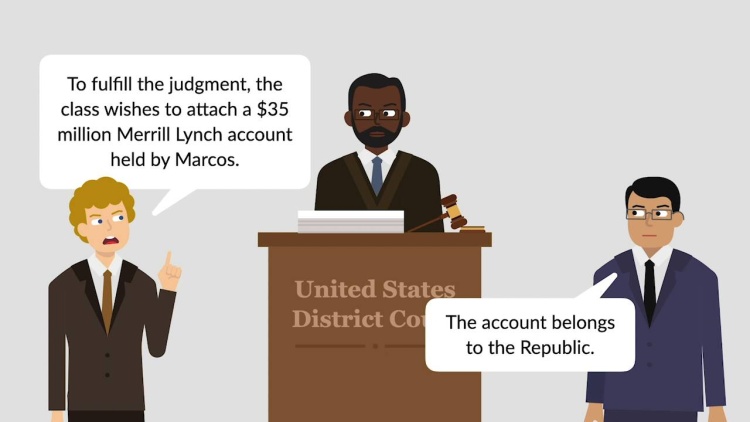Republic of Philippines v. Pimentel
United States Supreme Court
553 U.S. 851 (2008)
- Written by DeAnna Swearingen, LLM
Facts
Human rights victims (Pimentel) brought a class action suit against Philippine President Ferdinand Marcos. Pimentel obtained a nearly $2 billion judgment and later tried to attach a brokerage account at Merrill Lynch, Pierce, Fenner & Smith Inc. (Merrill Lynch) (plaintiff), which was owned by Arelma, S.A. (Arelma), a company incorporated by Marcos. The Republic of the Philippines and the Philippine Presidential Commission on Good Governance (collectively, the Republic) claimed the money in the brokerage account belonged to the Republic under Philippine law and asked Merrill Lynch to transfer the money to the Philippine National Banc (PNB), pending a decision by a Philippine court. Instead, Merrill Lynch filed an interpleader lawsuit in federal court to settle all the claims in one case, naming the Republic, Arelma, PNB, Pimentel, and others as defendants. The Republic claimed sovereign immunity and was dismissed from the lawsuit. The Republic then moved to dismiss the interpleader action, arguing that the case could not proceed without it because it was an indispensable party under Federal Rule of Civil Procedure (FRCP) 19. The district court denied the motion and continued to adjudicate the case. The Republic appealed the denial, and the United States Court of Appeals for the Ninth Circuit reversed and issued a stay, pending the outcome of the litigation in the Philippine court. The district judge vacated the stay and awarded the money to Pimentel. The Republic asked the Philippine court to declare the money forfeited, but that court has not yet ruled. The Republic, Arelma, and PNB appealed, but the court of appeals affirmed this time, largely because the Republic, despite being a required party under FRCP Rule 19(a), was unlikely to succeed on the merits of its claim. The defendants petitioned the United States Supreme Court for certiorari, which was granted.
Rule of Law
Issue
Holding and Reasoning (Kennedy, J.)
Concurrence/Dissent (Souter, J.)
Concurrence/Dissent (Stevens, J.)
What to do next…
Here's why 907,000 law students have relied on our case briefs:
- Written by law professors and practitioners, not other law students. 47,100 briefs, keyed to 996 casebooks. Top-notch customer support.
- The right amount of information, includes the facts, issues, rule of law, holding and reasoning, and any concurrences and dissents.
- Access in your classes, works on your mobile and tablet. Massive library of related video lessons and high quality multiple-choice questions.
- Easy to use, uniform format for every case brief. Written in plain English, not in legalese. Our briefs summarize and simplify; they don’t just repeat the court’s language.





